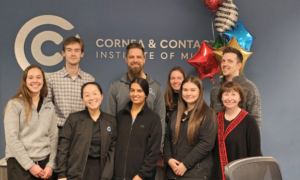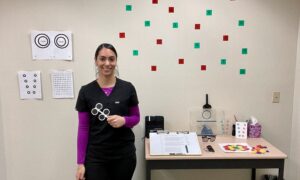By Lindsay Berry, OD

March 27, 2019
Deciding to become an optometrist, and then determining where to practice, are the first big professional decisions to make. Another important decision is what facet, if any, to specialize in. Here’s why I chose to focus on neuro-optometry and vision therapy, and how I’m building my career.
What Do You Truly Love to Do?
As a student, I had no idea of which field of optometry I wanted to specialize in, or if I even wanted to specialize. As I entered my fourth year of school, and participated in clinical externships, I loved several areas including ocular disease, low vision, vision therapy and brain-injury rehabilitation. To this day I think I would have been happy working in several areas, but my true passion is working with children.
Anytime I had a pediatric patient I would get excited, unlike some of my classmates. That’s when I realized I needed to pursue vision therapy and rehabilitation, two niches that draw many pediatric patients. When working in this specialty, I feel like I’m making a difference in the lives of my patients, both pediatric and adult. Through training of the visual and neurological pathways, I can impact the daily life and future of my patients.
This early decision to focus on neuro-optometry and vision therapy led me to accept a job as an associate with a practice specifically focused in those areas.
Advantages of Working in a Specialized Practice
Working in a specialty practice has many advantages. I enjoy simple wellness vision exams every now and then, but I love the challenge of trying to help someone in a way that very few people can.
Other Articles to Explore
The best part of specializing is the collaboration with so many providers in the community. Our practice works with optometrists, ophthalmologists, occupational therapists, physical therapists, speech therapists, pediatricians, neurologists, neuropsychologists, chiropractors, and many other health-care providers.
Having the opportunity to work with so many different providers is rewarding because we truly provide comprehensive care for the patient as a whole person.
Challenges of a Specialized Practice
A challenge of working in a specialty practice is that we rely heavily on referrals. The majority of our patients arrive to our office by a referral from another provider. When we get behind on marketing our office to local health-care providers, our patient load decreases dramatically.
Another challenge of a specialty practice is that patients don’t always understand the reason they need to see multiple eye doctors. Some patients initially have difficulty understanding how our office is different from their primary eye doctor, but once they have their exam, they find value in the specialized care.
More Work at the Beginning, Maybe Higher Salary Long-Term
Salary varies significantly based on practice location and population of the surrounding area. Based on my experience, and of what I have heard from friends, starting salary at a specialty practice is likely similar to, or often less, than salary at a primary-optometry practice. This may be due in part to the patient load being much less than a primary-care practice.
There also seems to be more of an initiation phase in specialty practice, having to almost literally “earn your keep“ at the practice. This initiation phase happens at primary-care practices as well, but seems more significant within specialty practices. However, once established in a practice, the earning potential is higher in a specialty practice due to the higher level of care and knowledge required.
Specialized Residency & Externships Are Helpful
Residency, or specialized practice externships, are not required to start a career in niche optometry, but extremely valuable when applying for jobs.
Demonstrating your dedication to the specialty is the key to getting hired. Employers want to see that you will be a valuable addition to their practice. Having extra experience, or knowledge, within the specialty will set you apart from other applicants.
Optimize Mentoring
My boss, the owner of the practice where I work, and I, have developed a friendly working relationship. We collaborate on many of our patients, sharing knowledge and experience. What I have appreciated most about our relationship is that it goes both ways.
There are many times when I seek advice from my boss, but there are also times when he asks for advice in return. This not only makes me feel valued and accepted as an associate, but demonstrates the respect we have for each other as colleagues.
It also demonstrates the dedication we have for our patients, to do all we can to provide the best care.
Do you practice specialized, niche optometry? Which area do you specialize in? How did you get started in your niche, and how are you continuing to grow as a provider of specialized services?
 Lindsay Berry, OD, is an associate at Neuro-Vision Associates of North Texas. To contact her: dr-berry@dr-s.net
Lindsay Berry, OD, is an associate at Neuro-Vision Associates of North Texas. To contact her: dr-berry@dr-s.net



























